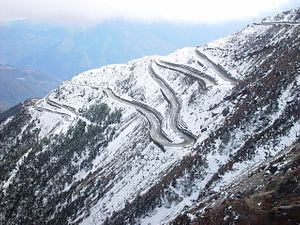Earlier this summer, we saw signs that India’s new government under the nationalist Bharatiya Janata Party and Prime Minister Narendra Modi would likely play a forward position in India’s border dispute with China. For example, New Delhi suggested it would provide “military training” to people living along the India-China border, developed plans to actively promote settlements in the region, and, more recently, announced that it would construct an 1,800 km highway along the India-China border.
This week, following prior trends, reports emerged that the Indian government will continue to bolster its claim to Arunachal Pradesh. According to the Times of India, the Indian government “has given an in-principle approval for induction of nearly 12,000 personnel in the Indo-Tibetan Border Police.” The Indo-Tibetan Border Police is the Indian force tasked with guarding the 3,488 km border with China.
“An in-principle approval has been made in this regard. Now that the home ministry has already cleared [the] creation of 54 border posts, manpower recruitment and training for the task is the immediate necessity. The force is awaiting the final policy approval after which large-scale recruitments will be launched,” said a spokesperson for the force.
These 12 battalions will be deployed at 54 new border outposts that will be built along the border. According to Live Mint, the Indo-Tibetan Border Police recently completed a “restructuring” that overhauled the force’s administrative structure and added additional capability.
China issued a word of warning regarding the Indian announcement. It specifically cautioned India against making any moves that would “complicate or exaggerate” the border dispute between the two countries. “China’s position on China-India boundary question is consistent and clear. We are committed to finding a solution to the boundary question with the Indian side through friendly negotiation as soon as possible and working together to safeguard peace and tranquility along the border,” Chinese foreign ministry spokesperson Hua Chunying said.
That echoes China’s standard response to Indian moves in the disputed region. “We should jointly safeguard the peace and tranquility of the border area and create favorable conditions for the final settlement of the border issue,” Chinese foreign ministry spokesperson Hong Lei said earlier, in reaction to India’s announcement of the highway in Arunachal Pradesh.
Arunachal Pradesh is an Indian state that is claimed almost in its entirety by China, which refers to the region as “South Tibet.” India and China additionally dispute Aksai Chin in Kashmir, a territory administered by China but claimed by India. During Chinese President Xi Jinping’s recent trip to India, he and Indian Prime Minister Narendra Modi indicated that they will work towards solving the border dispute in a “friendly, cooperative and constructive atmosphere.” However, Xi’s visit to India was overshadowed by a Chinese border incursion across the Line of Actual Control (LoAC) — the de facto India-China border in Kashmir.

































